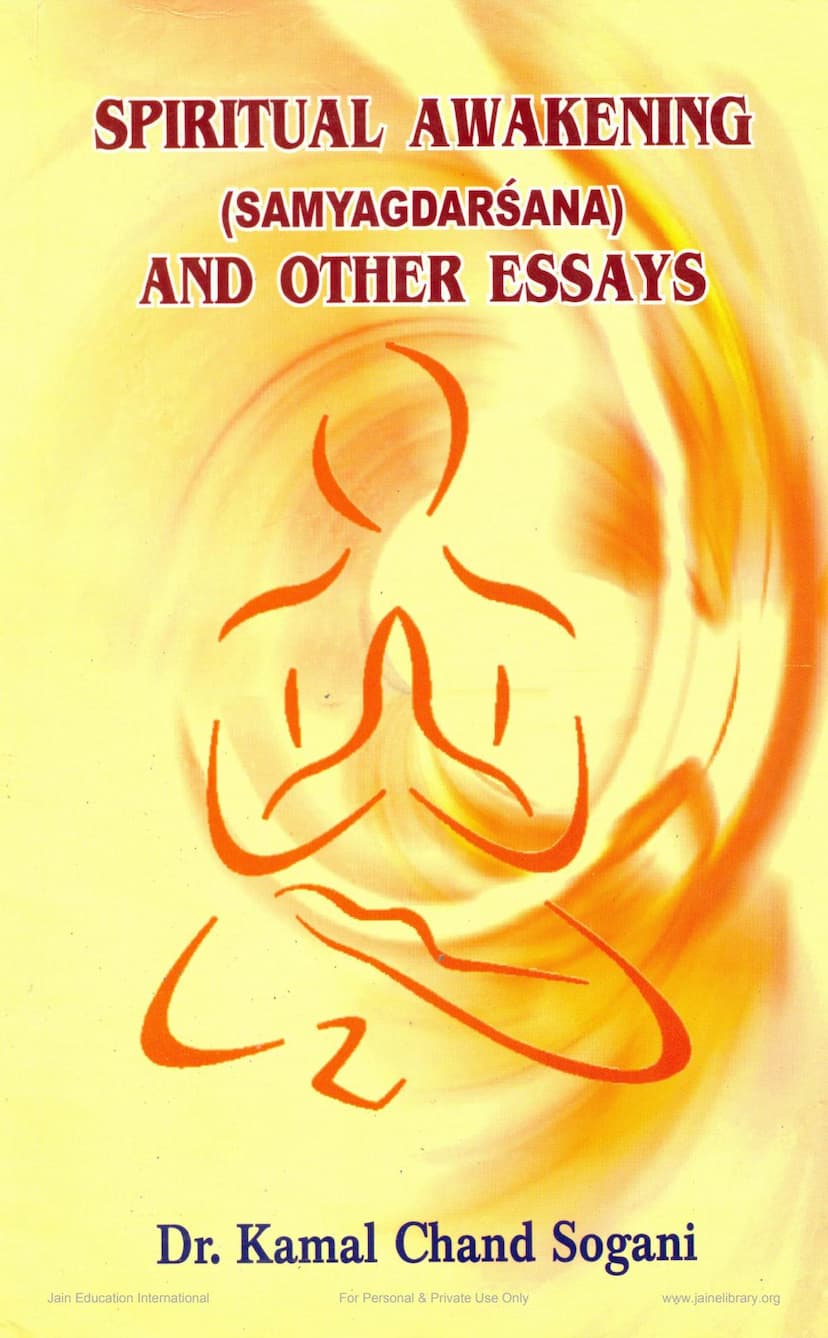Spiritual Awakening And Other Essays
Added to library: September 2, 2025

Summary
This book, "Spiritual Awakening (Samyagdarśana) and Other Essays" by Dr. Kamal Chand Sogani, is a collection of scholarly articles exploring various facets of Jain philosophy, ethics, and its contributions to Indian culture. The author, a former Professor of Philosophy, presents complex spiritual and ethical concepts in a way that bridges the spiritual and the mundane, making them relevant to contemporary readers.
The book is divided into seventeen essays, covering a wide range of topics. The primary focus of the book, as indicated by the title, is the Jaina concept of Samyagdarśana (Spiritual Awakening). This is presented as the ultimate goal of the spiritual aspirant, not as something external, but as the realization of one's true, transcendental self. The text explains that this spiritual awakening is hindered by Mithyātva (spiritual perversion), which creates a barrier to the soul's true life. Attaining Samyagdarśana is crucial, as it is the foundation for right knowledge and right conduct, leading to liberation (Moksha). The eight components of Samyagdarśana are detailed: Niḥsankita (steadfastness), Nihkāňkṣita (unhankering), Nirvicikitsā (non-disgust), Amūdhadsști (non-stupidity), Upagūhana (support), Sthitikaraña (stabilization), Vātsalya (affection), and Prabhāvanā (glorification). Accompanying these are also characteristics like Prasama, Samvega, Āstikya, Anukampā, Nindā, Garhā, and Bhakti.
Other significant essays delve into:
- Pariṣaha and Tapa (Afflictions and Austerities): The distinction between these concepts and their importance in the life of ascetics is explored. Pariṣahas are external afflictions to be endured, while Tapas are voluntary austerities. Both internal and external austerities are detailed, emphasizing their role in spiritual purification and the ultimate aim of desire renunciation.
- Indian Culture and Jainism: This essay highlights Jainism's deep roots in Indian culture, tracing potential connections to the Indus Valley civilization through Rṣabhanātha. It discusses Mahāvīra's teachings, the use of Prakrit, and Jainism's contributions to the concept of Sarvodaya. The essay enumerates Jainism's unprecedented contributions, including the principle of Ahiṁsā, Aparigraha (non-possession), the theory of Anekānta and Syādvāda, the doctrine of Karma, the path of Tri-ratna (Three Jewels), religious freedom for women and the downtrodden, the philosophy of vegetarianism, and Sallekhanā (spiritual acceptance of death). It also touches upon Jaina art and literature.
- The Concept of Aṇuvratas in Jainism: This essay explains the concept of limited vows undertaken by householders as a practical step towards moral and spiritual progress, contrasting them with the Mahāvratas of ascetics. The five Aṇuvratas (partial non-violence, truthfulness, non-stealing, chastity, and non-possession) are discussed in relation to the vices they aim to curb.
- Ahiṁsā and the Good: This essay explores Ahiṁsā not just as non-killing, but as the absence of attachment and aversion, and the essence of all virtues. It emphasizes the importance of both the social and spiritual dimensions of Ahiṁsā, defining the "good" (śubha) as an experience in tune with Ahiṁsā.
- Jaina Ethics and the Meta-ethical Trends: The author analyzes Jaina ethics in relation to modern meta-ethical debates, such as cognitivism vs. non-cognitivism, naturalism vs. non-naturalism, and subjectivism vs. objectivism, proposing that Jaina ethics offers a synthesis of these perspectives.
- Supersensuous Cognition (Avadhi and Manaḥparyaya): These essays delve into the Jaina concepts of clairvoyance (Avadhi) and telepathy (Manaḥparyaya), explaining their nature, limitations, and classification within the framework of Jaina epistemology.
- The Concept of 'Arahanta' in Jainism: This essay describes the Arahanta as a supreme object of devotion, embodying both the divine and the spiritual teacher. Their role in guiding souls and their state of embodied liberation are discussed.
- Science and Jaina View of Values: The essay highlights the limitations of science in dictating values, emphasizing the need for moral and spiritual principles, particularly Ahiṁsā, to guide scientific progress for the holistic development of humanity.
- Gandhi's Contribution to Philosophy and Religion: The author discusses Gandhi's philosophical contributions, focusing on his shift from "God is Truth" to "Truth is God," his emphasis on fundamental human situations, and his spiritual approach to religion rooted in service and prayer.
- Comparative Study of Ethical Ideals: This essay compares the expressions of ethical ideals in the Upanishads, the Bhagavad-Gītā, and Jainism, noting shared incentives for spiritual life, such as impermanence of worldly things, the suffering of transmigration, and bodily impurity. It also highlights similarities in the paths to liberation and the characteristics of the perfected sage.
- Concepts Common to the Upanishads, the Bhagavad-Gītā and Jainism: This essay further elaborates on the shared themes of spiritual incentives and the importance of faith, knowledge, and conduct across these traditions.
- Characteristics of the Perfected Sage: This section details the common traits of a perfected mystic as described in Jainism, the Gītā, and the Upanishads, including detachment from desires, transcendence of dualities, equanimity, and the experience of bliss.
- Story of My Contact with Dr. A. N. Upadhye: This personal essay reflects on the author's academic journey, his doctoral research on Jain ethics, and his deep respect and association with the renowned scholar Dr. A. N. Upadhye, particularly highlighting their shared interest in Prakrit studies.
- Discussion: Some Comments on "The Active and the Contemplative Values": This critical commentary engages with Professor Daya Krishna's distinction between active and contemplative values, arguing for the practical integration of both and highlighting historical examples of great figures who embodied both.
- Apabhraṁśa: Language, Manuscripts and Paumacariu of Svayambhu: This essay delves into the significance of the Apabhraṁśa language, its contribution to Indian literary heritage, and specifically discusses the retrieval and critical editing of Svayambhu's Paumacariu.
In essence, the book offers a profound and systematic exploration of Jain philosophical and ethical principles, presented with scholarly rigor and an insightful comparative approach. It underscores the centrality of spiritual awakening (Samyagdarśana) and Ahiṁsā in the Jaina path to liberation and highlights Jainism's enduring influence on Indian culture and thought.